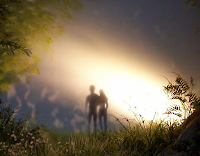
At the end of Genesis 3, Ish and Isha (Adam and Eve) are expelled from the garden of Eden: "So YHWH, God, sent him away from the garden of Eden, to work / the soil from which he had been taken. / He drove the human out / and caused to dwell, eastward of the garden of Eden, / the winged-sphinxes and the flashing, ever-turning sword / to watch over the way to the Tree of Life" (Fox translation).
Within the Jewish tradition, this is known simply as the expulsion from the garden, whereas in the Christian tradition it is understood (typically) as "The Fall." Basically, this amounts to two different readings/understandings of the story. In the first (Jewish) reading of the text, it is a driving out, an in-out movement. In the second (Christian) reading, it is an up-down movement.
So for this post, I'd like you to comment on these two different readings of the story. The difference in interpretation, though it seems subtle, is actually quite significant, and says a great deal about what the readers see or expect to see in the text. What are the implications of each reading? What do they mean? What do YOU see in the text? How do YOU read this text? These are some questions to get you started, but you are not limited only to these.
Remember--try to avoid incorporating religious beliefs or ideologies. Try, instead, to look just at the text.
Also--I'm looking to see that you think critically in your responses. This means I'm not looking for length, but quality.
Finally--be sure to read the responses of your peers before you post your comment. Try to respond to your peers' comments. Think of this as an online discussion, a virtual classroom, where you can engage in dialogue with one another. Feel free to disagree with people, but be courteous. Also feel free to raise additional questions that will enrich the discussion.
Don't forget to include your name!
YOU MUST POST A RESPONSE NO LATER THAN
MONDAY, JANUARY 21, 8PM.

